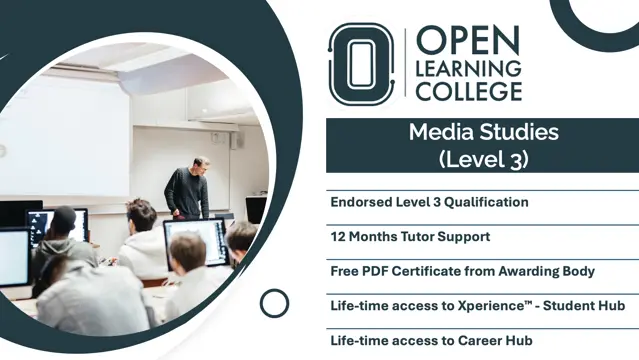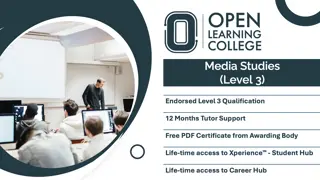
Media Studies (Level 3) Diploma
Distance Learning Course, featuring tutor support and AI assistance, available online or as a study pack option.
Open Learning College
Summary
Funding options available on our website
- QLS & OPA - Free
- Exam(s) / assessment(s) is included in price
- Tutor is available to students
- TOTUM card included in price What's this?
Add to basket or enquire
Overview
Embark on a transformative learning journey with the UK’s most innovative home study provider, offering courses designed to unlock your true potential and facilitate the career change you desire. Access our distance learning courses directly from anywhere, anytime, and acquire industry-recognised Professional Qualifications essential for advancing in your career.
Specifically, explore the flexible and convenient Media Studies (Level 3) course, an ideal way to gain a diploma qualification. Whether you aim for further education, improved job prospects, or expanded knowledge, this comprehensive course allows you to prepare thoroughly for exams or careers through home study. Plus, it’s structured to be accessible and beneficial even if you have no prior knowledge in Media Studies.
This Level 3 Diploma course is designed to appeal to learners aspiring to obtain a solid foundation in media studies. This diploma will also appeal to those with an interest in journalism, advertising and global media considerations. Media Studies as a subject is one that can be approached from the dual perspectives of the Humanities and Social Science. Media Studies explores the nature and effects of mass media upon individuals as well as society. This is done by the analysis of actual media content and representations. Media Studies is a cross-disciplinary field, and it uses techniques and applies theories from fields of sociology, cultural studies, anthropology, psychology, art theory, information theory and economics.
The course consists of ten modules and concludes with an online examination;
Module One – Media History
Module Two – Media Ethics
Module Three – Media and Television
Module Four – Audio Production
Module Five – Photography and Typography
Module Six – Mass Communication
Module Seven – Journalism
Module Eight – New Media Development
Module Nine – Media and Web Design
Module Ten – Global Media
Achievement
Certificates
QLS & OPA
Digital certificate - Included
Open Learning College have undergone external quality checks to ensure that the organisation and the courses’ it offers meet a high standard. Regular reviews of our courses are carried out as part of the endorsement process.
The course depth and study has been benchmarked at Level 3 against level descriptors published by Ofqual.
Visit www.qualitylicencescheme.co.uk for more information.
1. You will receive your accreditation directly from QLS, once you have successfully completed your course (certification fees are included in the course fee).
2. You will receive the Open Pathway Accreditation Diploma (OPA.dip) from Open Learning College.
Course media
Resources
- Media Studies Level 3 (QLS) Course -
Description
Module 1: Media History
In the UK, Media Studies as a distinct area emerged in the 1960s from the academic study of English, and from literary criticism more broadly. Media studies can partially be understood as a response to the ‘McCarthyist’paranoia of the influences of the mass media that was prevalent in the 1970s in the United States. In the UK, Mary Whitehouse’s right-wing National Viewers’ and Listeners’ Association was concerned at the growing ‘permissiveness’ of broadcasting, and in the US a number of pressure groups have campaigned against the supposed corrupting influence of popular media – in particular on children. This first module of the diploma explores the definitions we use in media studies. How the concept of the media came into being and how it subsequently evolved into what we now term ‘new media’. We consider questions such as; Has the philosophy really changed or has the technology just made original concepts smarter? The unit will examine the influences on media and how these have changed over the last 30 years. We will examine current trends and consider how media concepts will continue to evolve over the next 10 years.
Module 2: Media Ethics
In the second module of the diploma we consider Media ethics. Media ethics is the sphere of ethics that deals with the particular ethical principles and standards of media worldwide. In this diploma we consider ethical dilemmas and other such questions raised by the rise of mass media. One important subsection of media ethics that we shall also consider is journalism ethics. In this module we explore questions of ethics that regard to print and electronic media content, community standards, media censorship, media bias (in the U.S., ‘liberal’ vs. ‘conservative’ bias), propaganda, and related issues as viewed from the standpoint of ethics. Media ethics also deals with the relationship between media and media economics; the deregulation of the media, concentration of media ownership, FCC regulations in the U.S., media trade unions and labour issues, and other such worldwide regulating bodies, citizen media, (low power FM, community radio) – all have ethical implications.
Module 3: Media and Television
In the third module of the diploma we explore the role of Media and the technology of television. This module explores the impact in other countries and how television is used to support media and corporate objectives. In particular, we consider the relationship between this form of Media, its technology and young audiences. Not only are young audiences strong in numbers, they also exert enormous economic influence within the family – a fact that is not lost on the marketing and advertising industries. Once an ignored demographic for advertisers, today’s young people have become the most marketed-to generation in history, thanks to their spending power and their future clout as adult consumers.
Module 4: Audio Production
In the fourth module of this diploma we explore the area of Audio Production. The audio visual production in media broadly covers the following classifications;
- Animation.
- Commercials.
- Computer games.
- Corporate production.
- Facilities (which includes post production).
- Film.
- Interactive media.
- Photo imaging.
- Radio.
- Television and animation.
This module examines the concept of audio production, the latest technology developments and the influences these have had in new media applications.
Module 5: Photography and Typography
By the halfway stage in this diploma, learners will have acquired a more sophisticated and refined understanding of Media Studies. We continue to build upon this in our analytical approach to typographic form and design. This is an important and often overlooked aspect of Media Studies, and a prime consideration for those wishing to get their message across. The unit will include consideration of;
- Aspects of the history of letterforms, printing, and book design are examined.
- Typography is studied in the context of language communication.
- Systematic approaches to the design of complex information, including typographic, graphic and diagrammatic communication.
- Symbol creation and the design of visual identity systems.
- Photographic image creation and manipulation.
- Narrative concepts and the construction of meaning.
Social marketing. - Project research and management.
- Open exploration of non-applied visual communication design issues.
Module 6: Mass Communication
In this sixth module of the diploma, we explore Mass Communication. “Mass communication” is often used loosely to refer to the distribution of entertainment, arts, information, and messages by television, radio, newspapers, magazines, movies, recorded music, and associated media. The term “mass communication” is a term used in a variety of ways which, despite the potential for confusion, are usually clear from the context. These include;
- Reference to the activities of the mass media as a group.
- The use of criteria of a concept, “massiveness,” to distinguish among media and their activities.
- The construction of questions about communication as applied to the activities of the mass media.
Significantly, only the third of these uses does not take the actual process of communication for granted.
Module 7: Journalism
In the seventh module of the diploma, we consider Journalism as a discipline. Journalism is a discipline of collecting, analysing, verifying, and presenting information regarding current events, issues and people. We explore the relationship between the Media and the News. News-oriented journalism is sometimes described as the “first rough draft of history” (attributed to Phil Graham). Journalists often record important events first, producing news articles on short deadlines. While under pressure to be first with their stories, news media organisations usually edit and proofread their reports prior to publication, adhering to each organisation’s standards of accuracy, quality and style. Many news organisations claim proud traditions of holding government officials and institutions accountable to the public, while media critics have raised questions about holding the press itself to account.
Module 8: New Media Development
In the eighth module of the diploma we consider New Media Development. New Media is a relatively new field of study that has developed around changing cultural practices. The computer plays a central role as the medium for production, storage and distribution of New Media. New Media studies reflect on the social and ideological impact of the personal computer, computer networks, digital mobile devices, ubiquitous computing and virtual reality. This module includes the examination of researchers and propagators of new forms of artistic practices such as;
- Interactive installations,
- Net art and software art,
- New interfaces for musical expression,
- The subsets of interaction, interface design and the concepts of interactivity, multimedia and remediation.
This module explores the advances in new media and considers developments in new technology.
Module 9: Media and Web Design
In this penultimate module of the diploma, we explore Media and Web Design. This module examines the importance of website development and the use of websites in media development.
(Please click on the curriculum tab above to see a detailed view of each module)
Who is this course for?
Target Audience
- Media Studies is ideal for aspiring media professionals, communication enthusiasts, and individuals intrigued by the dynamic world of media.
- It caters to students keen on understanding the complexities of media, its impact on society, and those aspiring to pursue careers in journalism, broadcasting, advertising, or public relations.
- Additionally, it suits individuals eager to explore the production and analysis facets of media content creation, offering insights for those passionate about storytelling, media ethics, and cultural influences in communication.
Requirements
Course Requirements
- The good news is that no prior learning knowledge or experience is essential to take this course. This course is openly available to anyone wishing to learn more about Media Studies (Level 3) and would like to take part in a highly rewarding distance learning study course.
- We believe that everyone should have the opportunity to expand their knowledge and study further, so we try to keep our entry requirements to a minimum.
- You have the freedom to start the course at any time and continue your studies at your own pace for a period of up to 12 months from initial registration with full tutor support.
Career path
Social media managers lead an organisation’s social media strategy in order to boost visibility and customer and client engagement
Questions and answers
Reviews
Currently there are no reviews for this course. Be the first to leave a review.
Legal information
This course is advertised on reed.co.uk by the Course Provider, whose terms and conditions apply. Purchases are made directly from the Course Provider, and as such, content and materials are supplied by the Course Provider directly. Reed is acting as agent and not reseller in relation to this course. Reed's only responsibility is to facilitate your payment for the course. It is your responsibility to review and agree to the Course Provider's terms and conditions and satisfy yourself as to the suitability of the course you intend to purchase. Reed will not have any responsibility for the content of the course and/or associated materials.



